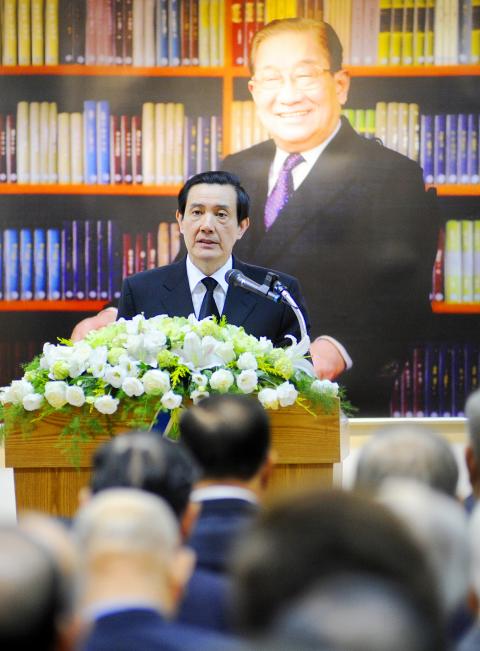President Ma Ying-jeou (馬英九) yesterday said that when he worked for then-Chinese Nationalist Party (KMT) secretary-general Lee Huan (李煥), both of them were branded as “Red Guards” because they were trying to push for major political reforms.
At a memorial for Lee, who died on Dec. 2 at the age of 93, Ma reflected on the days when the late KMT leader and government official was his boss.
Their main duties at the time were to prepare for the lifting of martial law, to allow for the formation of political parties and to replace a whole generation of National Assembly members, Ma said.

PHOTO: GEORGE TSORNG, TAIPEI TIMES
Ma said that because the later task affected many senior politicians, he and Lee were criticized and labeled “Red Guards” — a name drawn from the forces unleashed by former Chinese Communist Party leader Mao Zedong (毛澤東) to purge his political enemies in China during the Cultural Revolution from 1966 to 1976.
Ma praised Lee for contributing greatly to the process of retiring senior members of the National Assembly, amending the Constitution and pushing through other political reforms.
Acting on a directive by then-president Chiang Ching-kuo (蔣經國), Lee also worked in particular to cultivate Taiwan-born politicians, which was a major achievement that helped “build energy” for further political development, Ma said.
“It is necessary to illustrate Lee’s important role in helping to achieve the Republic of China’s transition to democracy,” Ma said.
The president issued a special citation in honor of Lee, which was accepted by Lee Ching-chung (李慶中), Lee Huan’s eldest son.
Lee Huan was born in Hubei Province, China, on Sept. 24, 1917. In addition to his KMT party posts, he served as education minister and premier before retiring.
Honoring his wishes for no altars, public mourning, condolence committees, obituaries or funeral services, his children held a “non-funeral service” yesterday.
Although it was an informal gathering, it was attended by a number of prominent politicians, including Legislative Speaker Wang Jin-pyng (王金平), Examination Yuan President John Kuan (關中), former KMT chairmen Lien Chan (連戰) and Wu Po-hsiung (吳伯雄), as well as New Party Chairman Yok Mu-ming (郁慕明).

The Ministry of Economic Affairs has fined Taobao NT$1.2 million (US$36,912) for advertisements that exceed its approved business scope, requiring the Chinese e-commerce platform to make corrections in the first half of this year or its license may be revoked. Lawmakers have called for stricter enforcement of Chinese e-commerce platforms and measures to prevent China from laundering its goods through Taiwan in response to US President Donald Trump’s heavy tariffs on China. The Legislative Yuan’s Finance Committee met today to discuss policies to prevent China from dumping goods in Taiwan, inviting government agencies to report. Democratic Progressive Party Legislator Kuo Kuo-wen (郭國文) said

The Ministry of Economic Affairs has fined Taobao NT$1.2 million (US$36,900) for advertisements that exceeded its approved business scope and ordered the Chinese e-commerce platform to make corrections in the first half of this year or its license would be revoked. Lawmakers have called for stricter supervision of Chinese e-commerce platforms and more stringent measures to prevent China from laundering its goods through Taiwan as US President Donald Trump’s administration cracks down on origin laundering. The legislature’s Finance Committee yesterday met to discuss policies to prevent China from dumping goods in Taiwan, inviting government agencies to report on the matter. Democratic Progressive Party

Taiwan and its Pacific ally Tuvalu on Tuesday signed two accords aimed at facilitating bilateral cooperation on labor affairs, according to Taiwan’s Ministry of Foreign Affairs (MOFA). The governments inked two agreements in Taipei, witnessed by Foreign Minister Lin Chia-lung (林佳龍) and visiting Deputy Tuvaluan Prime Minister Panapasi Nelesone, MOFA said in a news release. According to MOFA, the agreements will facilitate cooperation on labor issues and allow the two sides to mutually recognize seafarers’ certificates and related training. Taiwan would also continue to collaborate with Tuvalu across various fields to promote economic prosperity as well as the well-being of their

Sung Chien-liang (宋建樑), who led efforts to recall Democratic Progressive Party (DPP) Legislator Lee Kun-cheng (李坤城), was released on bail of NT$80,000 today amid outcry over his decision to wear a Nazi armband to questioning the night before. Sung arrived at the New Taipei District Prosecutors’ Office for questioning in a recall petition forgery case last night wearing a red armband bearing a swastika, carrying a copy of Adolf Hitler’s Mein Kampf and giving a Nazi salute. Sung left the building at 1:15am without the armband and covering the book with his coat. Lee said today that this is a serious